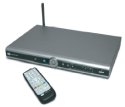Thank you, Mr. McNealy
April 25, 2006 Sun co-founder Scott McNealy's tenure as CEO came to an end this week, amidst a chorus of reaction. In this opinion piece, veteran Unix journalist Steven J. Vaughan-Nichols acknowledges McNealy's formative contributions to the computer industry, Internet, and open source as we know it. (more…)
Sun co-founder Scott McNealy's tenure as CEO came to an end this week, amidst a chorus of reaction. In this opinion piece, veteran Unix journalist Steven J. Vaughan-Nichols acknowledges McNealy's formative contributions to the computer industry, Internet, and open source as we know it. (more…)
 Chipmaker Cavium Networks is shipping a family of PCI-X cards aimed at increasing throughput of network and storage appliances based on commodity x86-based designs. The Octeon XL Accelerator cards feature multi-core MIPS64-based processors, throughputs between 500Mbps and 6Gbps, and are supported by a MontaVista Linux…
Chipmaker Cavium Networks is shipping a family of PCI-X cards aimed at increasing throughput of network and storage appliances based on commodity x86-based designs. The Octeon XL Accelerator cards feature multi-core MIPS64-based processors, throughputs between 500Mbps and 6Gbps, and are supported by a MontaVista Linux…  Elsevier Science has updated its embedded Linux text. The second edition of Linux for Embedded and Real-Time Applications includes revisions to reflect the 2.6-series kernel, along with 100 pages of new material, including chapters on uCLinux and the Eclipse IDE.
Elsevier Science has updated its embedded Linux text. The second edition of Linux for Embedded and Real-Time Applications includes revisions to reflect the 2.6-series kernel, along with 100 pages of new material, including chapters on uCLinux and the Eclipse IDE.  A graduate student in Colombia has developed a small ARM9 SBC (single-board computer) that runs Debian Linux. Carlos Camargo says he built his ECB_AT91 board for a doctoral research project in swarm robotics.
A graduate student in Colombia has developed a small ARM9 SBC (single-board computer) that runs Debian Linux. Carlos Camargo says he built his ECB_AT91 board for a doctoral research project in swarm robotics.  ClearCube is shipping a Linux-powered “virtual client” that offers secure remote access to a dedicated blade server running Windows XP. The I/Port I8020 client has more inherent security than a laptop, and provides the “full power” of a Pentium 4 from anywhere in the world, according to the company.
ClearCube is shipping a Linux-powered “virtual client” that offers secure remote access to a dedicated blade server running Windows XP. The I/Port I8020 client has more inherent security than a laptop, and provides the “full power” of a Pentium 4 from anywhere in the world, according to the company.  A Chinese company is touting an inexpensive Linux-based computer as a way to close the “digital divide.” YellowSheepRiver's $150 “Municator” appears to be available now, with a three-month leadtime, suggesting it could reach market well ahead of MIT's $100 “One Laptop Per Child” (OLPC) device.
A Chinese company is touting an inexpensive Linux-based computer as a way to close the “digital divide.” YellowSheepRiver's $150 “Municator” appears to be available now, with a three-month leadtime, suggesting it could reach market well ahead of MIT's $100 “One Laptop Per Child” (OLPC) device.  Media appliance software vendor Mediabolic has agreed to acquire Digital 5, which sells client and server stacks, protocol SDKs, and DRM (digital rights management) stacks for “connected” home entertainment devices.
Media appliance software vendor Mediabolic has agreed to acquire Digital 5, which sells client and server stacks, protocol SDKs, and DRM (digital rights management) stacks for “connected” home entertainment devices.  [Updated Apr. 24] — Snom is accepting advance orders for a basic model in its line of Linux-based business VoIP (voice-over-IP) phones. The Snom 300 supports six lines, and has six programmable buttons, along with a browser interface.
[Updated Apr. 24] — Snom is accepting advance orders for a basic model in its line of Linux-based business VoIP (voice-over-IP) phones. The Snom 300 supports six lines, and has six programmable buttons, along with a browser interface.  Foreword: In this guest editorial, FSMLabs CEO Victor Yodaiken relates his company's experiences in the real-time Linux market to Wind River's efforts to reposition embedded software development as “device software optimization,” or DSO.
Foreword: In this guest editorial, FSMLabs CEO Victor Yodaiken relates his company's experiences in the real-time Linux market to Wind River's efforts to reposition embedded software development as “device software optimization,” or DSO.